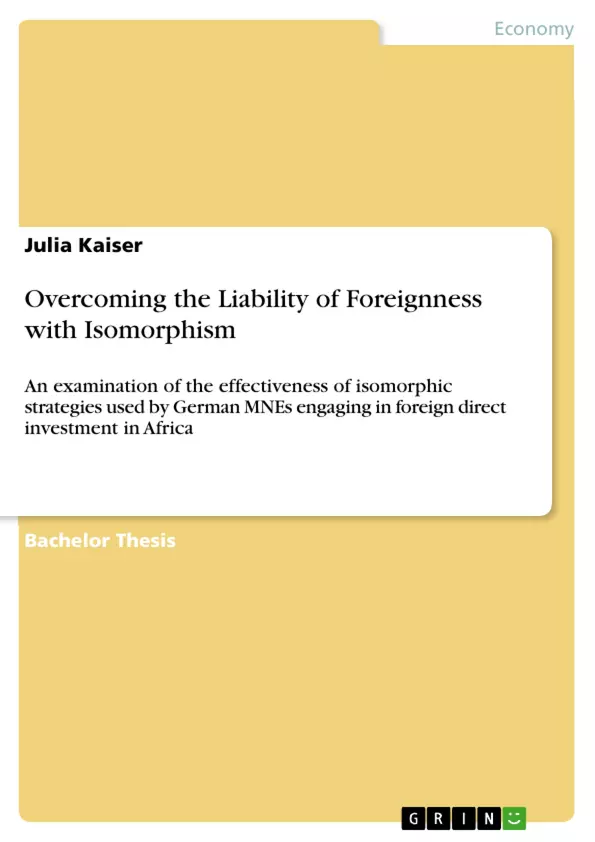The "liability of foreignness" (LOF) describes the additional costs that a firm operating in a market overseas incurs compared to the domestic firms. In recent years, researchers have laid the foundation for multiple theoretical approaches that aim to overcome the LOF. However, there is still a considerable research gap concerning actionable strategies MNEs can apply in practice. Building on the work of these researchers, this thesis aims at contributing to the current literature by taking the perspective of institutional theory. In particular, it examines the effectiveness of isomorphic strategies, inter alias, processes of adaption and imitation of legitimated practices, in reducing the LOF.
“We are improving”, said the German chancellor Angela Merkel at the G20 Investment Summit in 2019 as she reported on Germany’s efforts to encourage private investment in Africa. In an interview with the German ARD public television, she mentioned the “promising numbers” of the German investments in Africa; a continent that promised “more chances than risks”. Indeed, although German investments in Africa are still on a low level, Africa’s importance to Germany as an external trade partner has significantly increased. However, these opportunities have considerable costs and risks attached. One cost factor that is crucially important for German multinational enterprises (MNE) in Africa, as it is amplified by institutional distance, is the ‘liability of foreignness’ (LOF).
First of all, I use existing literature to construct frameworks to categorize the cost dimensions of the LOF and several isomorphic strategies. Furthermore, using semi-structured expert interviews, this paper evaluates the effectiveness of adaption strategies employed by German MNEs in Africa for different cost dimensions. I argue that isomorphism, i.e., adaption strategies, are of high importance for the success of German investments in Africa. More specifically, I show that networking, the adaption of formal structures, and the adaption to the institutional environment are effective in reducing the LOF by lowering market entry risks, facilitating knowledge acquisition as well as enhancing legitimacy in the host market.
Inhaltsverzeichnis (Table of Contents)
- Introduction
- Literature Review
- The Liability of Foreignness
- Business Impact of the LOF
- Deriving a Common Framework
- The Impact of Institutional Distance on the LOF of German MNEs in Africa
- Overcoming the Liability of Foreignness with Isomorphic Strategies
- Institutional Theory
- Isomorphism
- Building a Framework for Isomorphic Strategies
- The Liability of Foreignness
- Hypothesis Development
- Methodology
- Results
- Unfamiliarity and the Lack of Relationships
- Discrimination
- Legal and Political Environment
- Cultural Differences
- Discussion and Conclusion
- Findings
- Practical Implications
- Limitations and Further Research
- References
- Appendices
Zielsetzung und Themenschwerpunkte (Objectives and Key Themes)
This thesis aims to contribute to the current literature on overcoming the Liability of Foreignness (LOF) by examining the effectiveness of isomorphic strategies, specifically adaptation and imitation of legitimated practices, in reducing the LOF for German multinational enterprises (MNEs) investing in Africa.
- Understanding the Liability of Foreignness and its impact on German MNEs in Africa
- Analyzing the effectiveness of isomorphic strategies in mitigating the LOF
- Examining specific adaptation strategies employed by German MNEs and their impact on various cost dimensions of the LOF
- Exploring the role of networking, formal structure adaptation, and institutional environment adaptation in reducing the LOF
- Evaluating the potential of isomorphic strategies to enhance the success of German investments in Africa
Zusammenfassung der Kapitel (Chapter Summaries)
The introduction sets the stage for the thesis by highlighting the growing importance of Africa for German trade and investment, while emphasizing the challenges posed by the Liability of Foreignness (LOF) for German MNEs operating in the region.
The literature review delves into the concept of the LOF, exploring its various dimensions and costs. It examines the impact of institutional distance on the LOF faced by German MNEs in Africa and explores how isomorphic strategies can be used to overcome these challenges. The chapter also provides a framework for understanding and categorizing the various isomorphic strategies.
The methodology section outlines the research design, including the use of semi-structured expert interviews to assess the effectiveness of adaptation strategies employed by German MNEs in Africa.
The results chapter presents key findings from the interviews, analyzing the effectiveness of various isomorphic strategies in reducing the LOF across different cost dimensions. The chapter examines the impact of unfamiliarity, discrimination, the legal and political environment, and cultural differences on the LOF and the effectiveness of adaptation strategies in addressing these challenges.
Schlüsselwörter (Keywords)
This thesis focuses on the key themes of the Liability of Foreignness (LOF), isomorphic strategies, adaptation, institutional theory, German multinational enterprises (MNEs), foreign direct investment, Africa, and institutional distance.
Frequently Asked Questions
What is the "Liability of Foreignness" (LOF)?
LOF describes the additional costs and risks that a firm incurs when operating in a foreign market compared to local competitors.
How can isomorphic strategies help overcome LOF?
Isomorphic strategies involve adapting to or imitating legitimized practices in the host country to gain legitimacy and reduce institutional distance.
Why is Africa a focus for German MNEs in this study?
Africa is becoming an increasingly important trade partner for Germany, but the high institutional distance amplifies the liability of foreignness.
What specific adaptation strategies are effective?
Networking, adapting formal structures, and aligning with the local institutional environment are key to lowering entry risks and acquiring local knowledge.
What role does discrimination play in LOF?
Foreign firms may face discriminatory treatment from local governments or consumers; isomorphic strategies help mitigate this by enhancing the firm's local legitimacy.
- Quote paper
- Julia Kaiser (Author), 2020, Overcoming the Liability of Foreignness with Isomorphism, Munich, GRIN Verlag, https://www.grin.com/document/1030632



